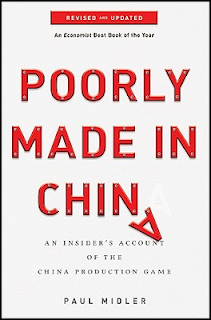Title: Poorly Made in China
Author: Paul Midler
Genre: Non-fiction (China)
Notes: Published by John Wiley & Sons. Was an Economist Best Book of the Year in 2009.
Why I read it:
I live in Beijing, so an interest in books on China is pretty much a given for me. However, I didn’t seek this one out – it was simply in a pile of books lent to me by a friend.
What it’s about:
The thoughts and frustrations of one American working in Guangzhou, chronicling time spent as a middleman in China’s manufacturing industry. Trust me when I say it’s definitely not as boring as it sounds.
My Review:
Poorly Made in China was marketed as a hard-hitting exposé of manufacturing practices; meaning when I first picked it up, I expected a businessman’s cynical diatribe on Chinese industry. Turns out I was wrong. Most of Midler’s book consists of entertaining anecdotes, and while it occasionally gets cynical, this is done is a very readable, informative way.
This book was commissioned by Wiley Publishers on the strength of other articles (such as this one) that Midler wrote on quality fade in China. It’s a problem many foreign importers face when doing business here. Local manufacturers promise low prices and great service, and they deliver – for a while, at least. But later, corners are cut in the name of profit. Yields are reduced. Substandard materials are used. And this practice is often overlooked (if it is noticed at all!) because, taken individually, each issue is a trivial one. An importer can’t afford to halt production, thereby displeasing their customer, while they find a new factory.
But this book is not a dry economic text. It was written by someone who spent years working around Guangzhou, speaks Mandarin fluently, and clearly loves China. There are anecdotes about all sorts of people he met: over-familiar importers, savvy manufacturers, diamond dealers, interns. Most are related about judgement. I personally found it enthralling; for as an English teacher working in a first-tier city, my experience of China has been widely different from his. For example, Midler frequently stresses that China in a developing country. At one stage, he talks about one factory producing beauty products, where he realized that most employees had no clue what they were making. They could, however, identity every product by number. Why?
Because “many of the workers at the factory barely had a primary school education, and most came from hundreds or thousands of miles away [...] Before they came to work at the factory, they did not know what something like “hair gel” was. Most had not grown up using things like shampoo” (p39).My Chinese friends, on the other hand, are all well educated. Most speak English and went to university in Beijing. They love KTV, spend hours on Taobao and QQ (vices I now share!) and most definitely grew up using shampoo. Beijing feels more cosmopolitan and vibrant than cities back home in New Zealand. “Developing” isn’t an adjective I’d rush to use here. But China is a big place, and it’s certainly interesting reading about other parts of it.
Conclusion
I enjoyed Poorly Made in China. I can’t comment on its accuracy, but I found it an entertaining and enlightening read. Recommended.

No comments:
Post a Comment